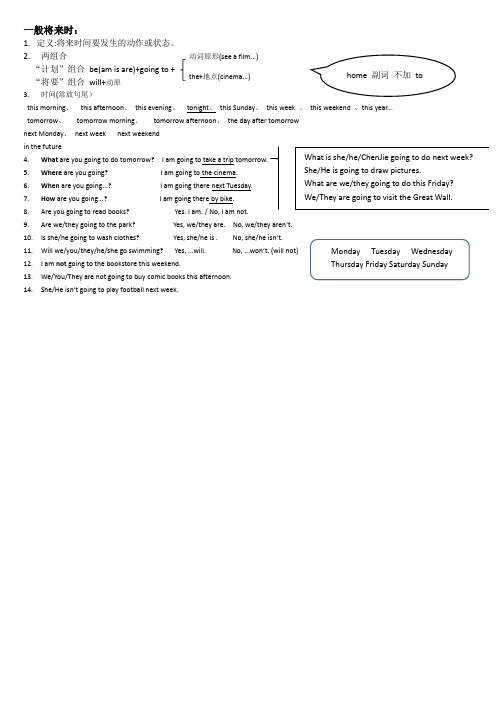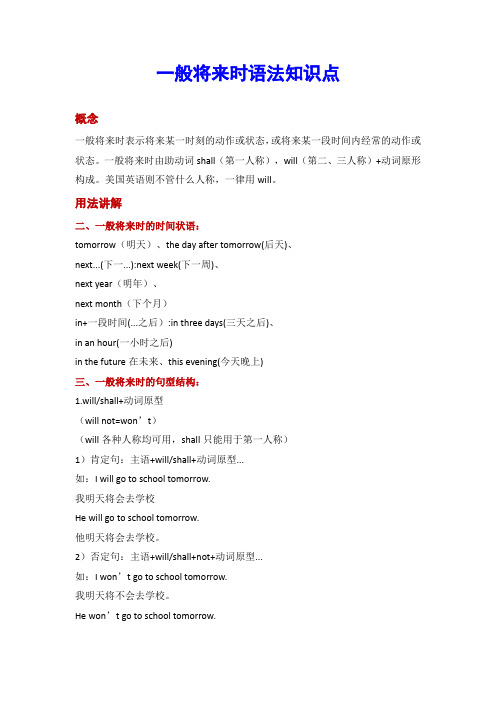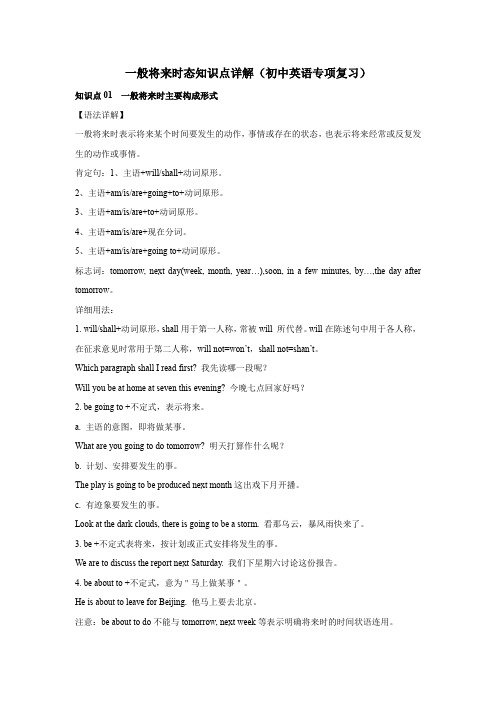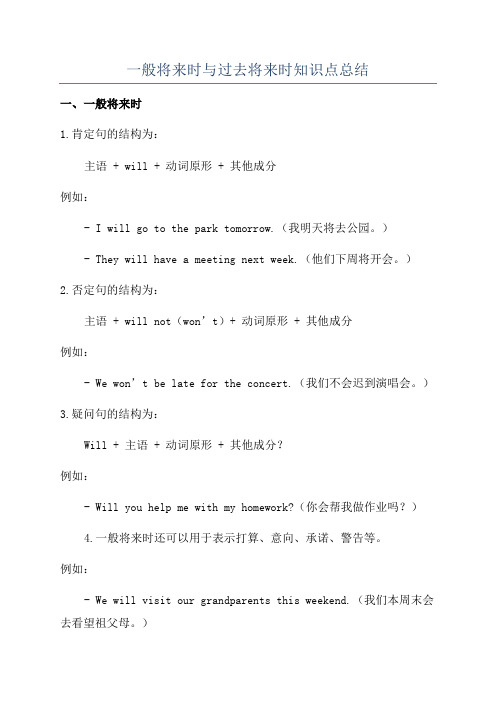一般将来时知识点
一般将来时 知识点

一般将来时:1. 定义:将来时间要发生的动作或状态。
2. 两组合 “计划”组合 be(am is are)+going to + “将要”组合 will+动原3. 时间(常放句尾) this morning 、 this afternoon 、 this evening 、 tonight 、 this Sunday 、 this week 、 this weekend 、this year... tomorrow 、 tomorrow morning 、 tomorrow afternoon 、 the day after tomorrownext Monday 、 next week next weekendin the future4.What are you going to do tomorrow?I am going to take a trip tomorrow. 5.Where are you going?I am going to the cinema. 6.When are you going...? I am going there next Tuesday. 7.How are you going...? I am going there by bike. 8.Are you going to read books? Yes. I am. / No, I am not. 9. Are we/they going to the park? Yes, we/they are. No, we/they aren ’t. 10. Is she/he going to wash clothes? Yes, she/he is . No, she/he isn ’t.11. Will we/you/they/he/she go swimming? Yes, ...will. No, ...won ’t. (will not)12. I am not going to the bookstore this weekend.13. We/You/They are not going to buy comic books this afternoon.14. She/He isn ’t going to play football next week. 动词原形(see a film...)the+地点(cinema...)。
一般将来时提问句型

一般将来时提问句型知识点讲解一、一般将来时的概念一般将来时表示将来某一时刻的动作或状态,或将来某一段时间内经常的动作或状态。
常常和表示将来的时间状语连用,如:tomorrow(明天),next week(下周),in the future (将来)等。
一般将来时由助动词shall(第一人称),will(第二、三人称)动词原形构成。
美国英语则不管什么人称,一律用will。
二、一般将来时的形式will / shall + 动词原形这种方法一般单纯地表示将来某个时间将要发生的动作或存在的状态。
will用于各种人称;shall只用于第一人称。
例如:I will / shall go to visit him next week. 下周我将去拜访他。
What time shall we meet next Saturday? 下星期六我们什么时候见面?be going to + 动词原形be going to 相当于一个助动词(其中be有人称和数的变化),与它后面的动词原形共同构成谓语,表示将来某个时间要发生的动作或存在的状态。
例如:He is going to play football this afternoon. 今天下午他要去踢足球。
They are going to have a meeting tomorrow. 他们明天要开会。
三、一般将来时的用法1表示将来的动作或状态一般将来时常与一些表示将来的时间状语连用,如:tomorrow(明天),next week(下周),from now on(从现在开始);in the future(将来)等。
例如:I will do a better job next time. 下次我要做得更好。
Oil and water will not mix. 油和水没法混在一起。
“be going to+动词原形”表示即将发生的或最近打算进行的事。
例如:①It is going to rain. 要下雨了。
一般将来时语法知识点

一般将来时语法知识点概念一般将来时表示将来某一时刻的动作或状态,或将来某一段时间内经常的动作或状态。
一般将来时由助动词shall(第一人称),will(第二、三人称)+动词原形构成。
美国英语则不管什么人称,一律用will。
用法讲解二、一般将来时的时间状语:tomorrow(明天)、the day after tomorrow(后天)、next...(下一...):next week(下一周)、next year(明年)、next month(下个月)in+一段时间(...之后):in three days(三天之后)、in an hour(一小时之后)in the future在未来、this evening(今天晚上)三、一般将来时的句型结构:1.will/shall+动词原型(will not=won’t)(will各种人称均可用,shall只能用于第一人称)1)肯定句:主语+will/shall+动词原型...如:I will go to school tomorrow.我明天将会去学校He will go to school tomorrow.他明天将会去学校。
2)否定句:主语+will/shall+not+动词原型...如:I won’t go to school tomorrow.我明天将不会去学校。
He won’t go to school tomorrow.他明天将不会去学校。
3)一般疑问句:Will/Shall+主语+动词原型...如:Will you go to school tomorrow?你明天要去学校吗?Will he go to school tomorrow?他明天要去学校吗?肯定回答:Yes,主语+will.如:Yes,I will.Yes,he will.否定回答:No,主语+will+not.如:No,I won’t.No,he won’t.4)特殊疑问句:特殊疑问词+will/shall+主语+动词原型... 如:What will you do tomorrow?你明天将会做什么?What will he do tomorrow?他明天将会做什么?2.be going to+动词原型1)肯定句:主语+be going to+动词原型...如:I am going to buy some books tomorrow.我明天打算去买一些书。
初中英语知识点总结:一般将来时

初中英语知识点总结初中英语知识点总结 第 1 页 共2 页 初中英语知识点总结:一般将来时(1)一般将来时表示将要发生的动作或存在的状态。
常与表示将来的时间状语连用:tomorrow, next week, next month, in a few days, from now on 。
如。
如I ’m going to visit the museum this Sunday.I ’ll be there in half an hour.We ’ll arrive tomorrow.(2)一般将来时的构成)一般将来时的构成①be going to + 动词原形。
Be 随主语人称和数的变化而变化,否定句在be 后面加not, 疑问句是将be 放到主语之后。
例如:放到主语之后。
例如: It ’s going to be fine tomorrow.He isn ’t going to speak at the mee ng.What are you going to do next?②will +动词原形。
Will 可以和各种人称及数的主语连用。
否定句在will 后加not,缩写成won ’t ,疑问句需将will 提至主语之前。
例如:提至主语之前。
例如: We will have a basketball match next week.Will you come to the party?I son ’t lend it to you.③shall + 动词原形。
此结构常用于主语为第人称I / we 的句中,疑问句表示提建议或征求意见。
如:问句表示提建议或征求意见。
如:When and where shall we meet ?Shall I turn on the TV ?初中英语知识点总结初中英语知识点总结 第 2 页 共 2 页 (3) 一般将来时的基本用法。
一般将来时的基本用法。
① “be going to +动词原形”表示“意图”,即打算、计划要做某事。
一般将来时知识点整理

一般将来时知识点整理
嘿,宝子们!今天咱来聊聊一般将来时那些事儿。
一般将来时呀,就是表示将来要发生的动作或存在的状态哦!就好比你说明天我要去逛街,这就是一般将来时啦。
例子:I will go shopping tomorrow.(我明天会去购物。
)
一般将来时有好几种表现形式呢。
首先,常见的就是“will+动词原形”啦,这就像一个坚定的承诺,比如 He will come to see you.(他会来看你的。
)再者呢,还有“be going to+动词原形”,这就好像是有计划、有
打算的未来行动,就像 She is going to study abroad.(她打算出国留学。
)哎呀,这不就像是你满心期待着要做一件很棒的事情嘛!
想象一下,你和朋友约好了下个月一起去旅行,你肯定会说 We are going to travel next month. (我们下个月要去旅行。
)而不是说其他时
态呀,对吧?一般将来时多重要呀!
还有哦,一般将来时还可以和一些表示将来的时间状语搭配使用呢,比如 tomorrow(明天)、next week(下周)、in the future(未来)等等。
你想想看,要是没有这些时间状语来明确时间,那岂不是有点迷糊啦?
宝子们,一般将来时真的超级有用的,一定要好好掌握呀,以后说英语可就靠它啦!别小瞧它哟,学会了它就能更好地表达对未来的憧憬啦!哈哈!。
一般将来时态知识点详解(初中英语专项复习) (4)

一般将来时态知识点详解(初中英语专项复习)知识点01 一般将来时主要构成形式【语法详解】一般将来时表示将来某个时间要发生的动作,事情或存在的状态,也表示将来经常或反复发生的动作或事情。
肯定句:1、主语+will/shall+动词原形。
2、主语+am/is/are+going+to+动词原形。
3、主语+am/is/are+to+动词原形。
4、主语+am/is/are+现在分词。
5、主语+am/is/are+going to+动词原形。
标志词:tomorrow, next day(week, month, year…),soon, in a few minutes, by…,the day after tomorrow。
详细用法:1. will/shall+动词原形,shall用于第一人称,常被will 所代替。
will在陈述句中用于各人称,在征求意见时常用于第二人称,will not=won’t,shall not=shan’t。
Which paragraph shall I read first? 我先读哪一段呢?Will you be at home at seven this evening? 今晚七点回家好吗?2. be going to +不定式,表示将来。
a. 主语的意图,即将做某事。
What are you going to do tomorrow? 明天打算作什么呢?b. 计划、安排要发生的事。
The play is going to be produced next month这出戏下月开播。
c. 有迹象要发生的事。
Look at the dark clouds, there is going to be a storm. 看那乌云,暴风雨快来了。
3. be +不定式表将来,按计划或正式安排将发生的事。
We are to discuss the report next Saturday. 我们下星期六讨论这份报告。
一般将来时知识点

一般将来时知识点一般将来时是英语中常用的一种时态,用来表示将来发生的动作或状态。
在句子中,一般将来时通常由助动词"will"或"shall"加动词原形构成。
除了表示将来的动作或状态外,一般将来时还可以表示决心、意图、预测、承诺以及请求等不同的语义。
下面是一些一般将来时的知识点:1.一般将来时的基本结构:主语 + will/shall + 动词原形+ …例如:- I will visit my grandparents tomorrow.(我明天会去看望我的祖父母。
)- He shall help you with the project.(他会帮助你完成这个项目。
)2.一般将来时的否定形式:主语 + will not/shall not + 动词原形+ …例如:- They will not arrive on time.(他们不会准时到达。
)- She shall not attend the meeting.(她不会参加会议。
)3.一般将来时的疑问形式:将助动词"will"或"shall"提前到句子的主语之前,并且将句末的问号加在句子结束处。
例如:- Will you come to the party?(你会来参加聚会吗?)- Shall we go for a walk?(我们去散步好吗?)4.一般将来时与时间状语的搭配:一般将来时经常和表示将来时间的状语词或短语一起使用,如:tomorrow(明天)、next week(下周)、in the future(在未来)等。
例如:- We will have a meeting tomorrow.(我们明天有个会议。
)- She shall complete the report next week.(她下周会完成这份报告。
)5.一般将来时表示打算、意图:一般将来时也经常用来表示打算、意图或计划要做某事。
一般将来时与过去将来时知识点总结

一般将来时与过去将来时知识点总结一、一般将来时1.肯定句的结构为:主语 + will + 动词原形 + 其他成分例如:- I will go to the park tomorrow.(我明天将去公园。
)- They will have a meeting next week.(他们下周将开会。
)2.否定句的结构为:主语 + will not(won’t)+ 动词原形 + 其他成分例如:- We won’t be late for the concert.(我们不会迟到演唱会。
)3.疑问句的结构为:Will + 主语 + 动词原形 + 其他成分?例如:- Will you help me with my homework?(你会帮我做作业吗?)4.一般将来时还可以用于表示打算、意向、承诺、警告等。
例如:- We will visit our grandparents this weekend.(我们本周末会去看望祖父母。
)- He will work hard to pass the exam.(他会努力学习以通过考试。
)- I won’t accept the j ob offer.(我不会接受这个工作机会。
)5.当表示将来的时间或条件时,可以使用其他时间状语或条件从句来修饰。
例如:二、过去将来时过去将来时用于表示过去一些时间将要发生的动作或状态,一般由助动词"would"或"should"加上动词的原形构成。
1.肯定句的结构为:主语 + would / should + 动词原形 + 其他成分例如:- She said she would meet me at the airport yesterday.(她说她昨天会在机场接我。
)- They knew they should finish their homework before going out.(他们知道他们应该在出去之前完成作业。
- 1、下载文档前请自行甄别文档内容的完整性,平台不提供额外的编辑、内容补充、找答案等附加服务。
- 2、"仅部分预览"的文档,不可在线预览部分如存在完整性等问题,可反馈申请退款(可完整预览的文档不适用该条件!)。
- 3、如文档侵犯您的权益,请联系客服反馈,我们会尽快为您处理(人工客服工作时间:9:00-18:30)。
一般将来时知识点
一、构成:
例如:
I will go to school tomorrow.(我明天将去学校。
)
She won't help me with my homework.(她将不会帮我做作业。
)二、肯定句的构成:
主语 + will/shall + 动词原形 + 其他。
三、否定句的构成:
主语 + will not/shall not/won't/shan't + 动词原形。
四、疑问句的构成:
将辅助动词will/shall提到主语前面。
五、一般将来时的用法:
1.表示将来计划、打算或意愿。
例如:
I will visit my grandparents next month.(下个月我将去拜访我的祖父母。
)
He will help you with your project.(他将帮助你完成你的项目。
)
2.表示对未来事物的预测或推测。
例如:
It will rain tomorrow.(明天将会下雨。
)
3.表示对将来事件的承诺或约定。
例如:
They won't be late for the meeting.(他们不会迟到参加会议。
)
4.表示习惯性、定期发生的动作或存在的状态。
例如:
He will always watch TV after dinner.(他晚饭后经常看电视。
)They will be in Shanghai next week.(下周他们将在上海。
)
5.用于条件句中,表示对未来情况的假设。
例如:
If it rains tomorrow, we won't go hiking.(如果明天下雨,我
们不会去远足。
)
6.用于请求、建议、命令等语气中。
例如:
Will you close the window?(请你关上窗户好吗?)
You should study harder.(你应该更加努力学习。
)
六、一般将来时的时间状语:
表示将来的时间状语有:tomorrow(明天)、next week(下周)、
in the future(将来)、soon(很快)、later(后来)、next year
(明年)等。
七、一般将来时与其他时态的区别:
一般将来时表示将来要发生的动作或存在的状态,强调的是将来的时
间点。
它与现在进行时的区别在于,现在进行时表示现在正在进行的动作,而一般将来时表示将来会进行的动作。
它与一般现在时的区别在于,一般
现在时表示经常或习惯性发生的动作或状态,而一般将来时表示将来要发
生的动作或存在的状态。
总结:一般将来时是英语中用来表示将来要发生的动作或存在的状态
的时态。
它是由助动词“will”或“shall”加上动词原形构成的。
一般
将来时的用法有表示计划、打算、意愿、预测或推测、承诺等。
同时,一
般将来时与现在进行时、一般现在时的区别是:现在进行时表示正在进行
的动作,一般现在时表示经常或习惯性发生的动作,而一般将来时表示将
来要发生的动作。
